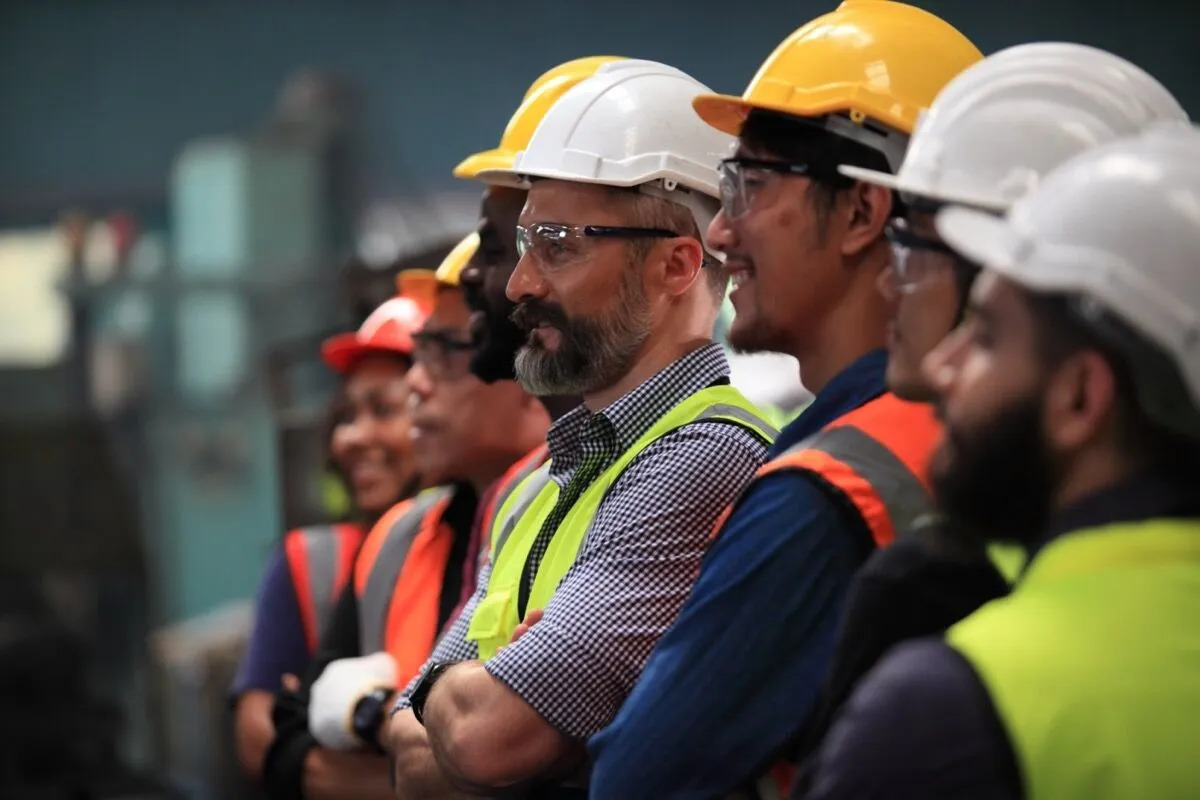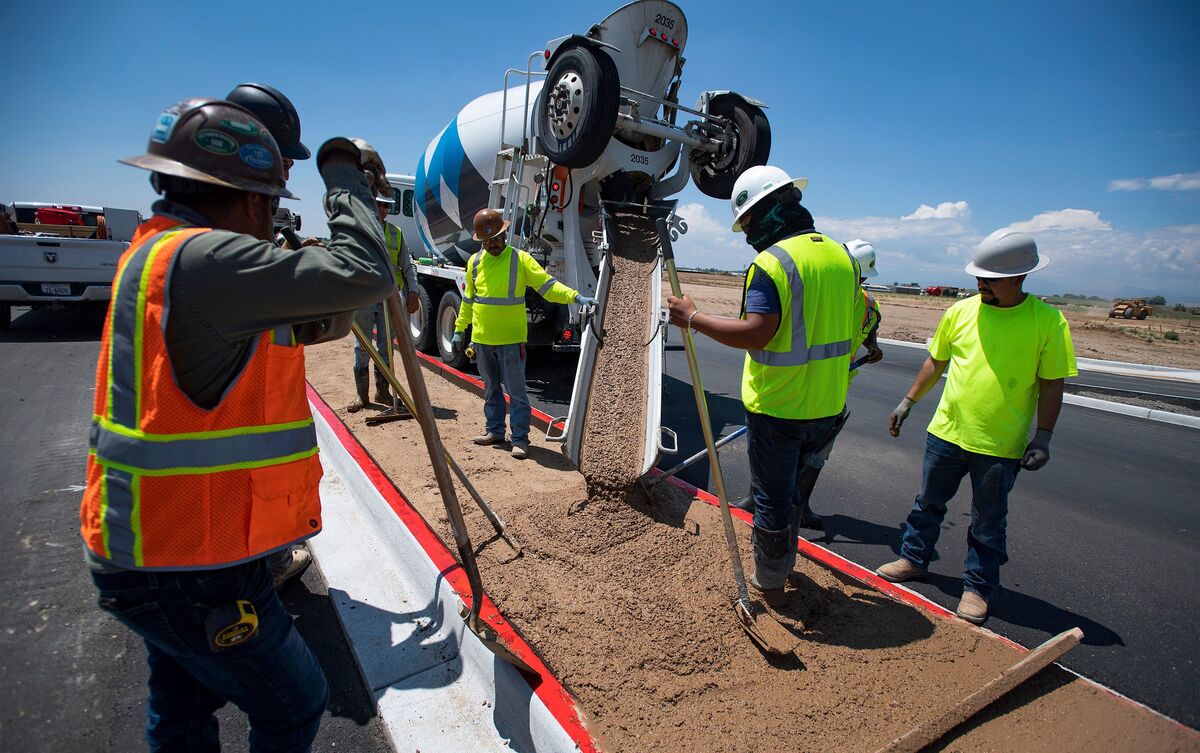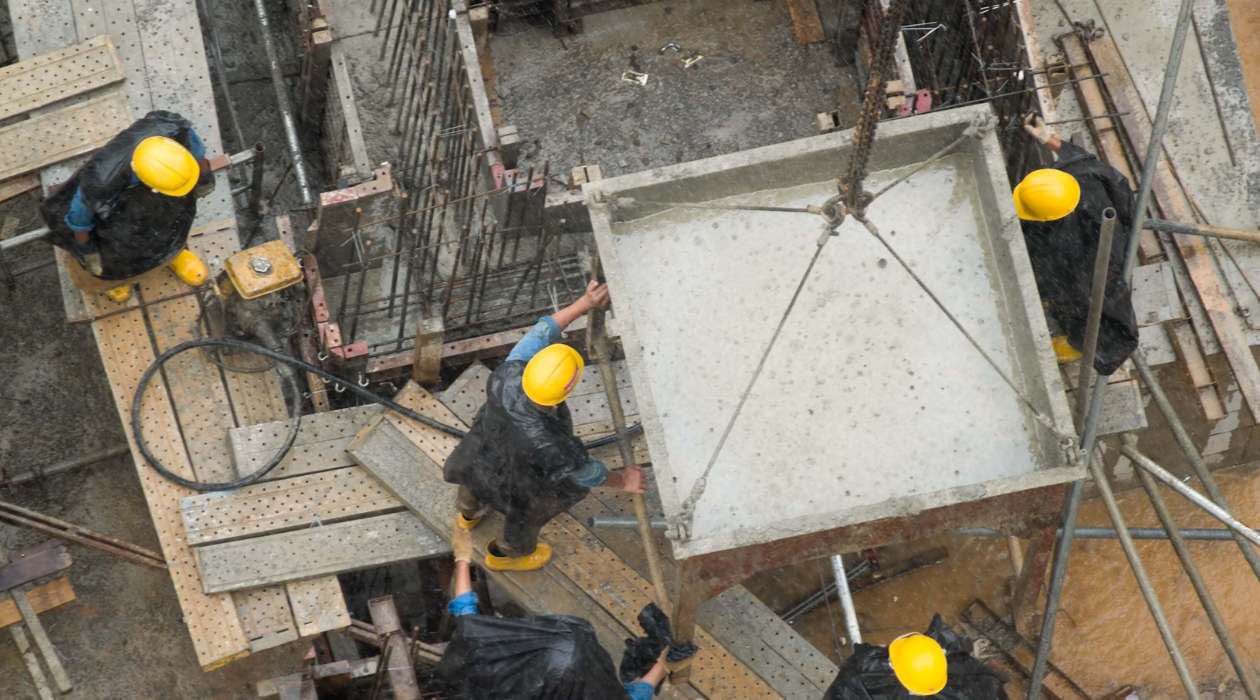Home>diy>Building & Construction>What Are The Opportunities For Advancement For A Construction Worker


Building & Construction
What Are The Opportunities For Advancement For A Construction Worker
Modified: November 1, 2024
Discover the growth possibilities for a construction worker in the building construction industry. Explore opportunities for advancement and career development.
(Many of the links in this article redirect to a specific reviewed product. Your purchase of these products through affiliate links helps to generate commission for Storables.com, at no extra cost. Learn more)
Introduction
Welcome to the world of construction, an industry that plays a vital role in shaping the world we live in. Construction workers are the backbone of this industry, responsible for building and maintaining our homes, offices, roads, bridges, and infrastructure. If you’re considering a career in construction, you may be wondering about the opportunities for advancement within this field.
In this article, we will explore the various paths for career progression in construction and discuss how you can elevate your skills, qualifications, and responsibilities within the industry. Whether you’re starting as an entry-level worker or already have some experience under your belt, there are numerous avenues for growth and development.
So, let’s dive in and discover the exciting opportunities that await you as a construction worker!
Key Takeaways:
- Construction workers have numerous opportunities for career advancement, including specialization, apprenticeship programs, promotions, and continuous learning. Embracing these paths can lead to fulfilling and rewarding careers within the industry.
- The construction industry offers diverse avenues for entrepreneurship and alternative careers, such as general contracting, construction safety management, and construction architecture. Exploring these options allows individuals to contribute to the industry in unique and fulfilling ways.
Read more: What Do Construction Workers Wear
Overview of the Construction Industry
The construction industry is a vast and diverse sector that encompasses a wide range of activities, including residential, commercial, industrial, and civil construction projects. From building towering skyscrapers to constructing intricate road networks, the industry offers a multitude of opportunities for construction professionals.
Construction projects are typically undertaken by project teams, consisting of architects, engineers, construction managers, and skilled laborers. These teams work collaboratively to bring architectural designs to life, ensure structural integrity, and meet the functional requirements of each project.
As a construction worker, you will be involved in various tasks that contribute to the successful completion of a project. These tasks can include site preparation, excavation, concrete pouring, carpentry, welding, plumbing, electrical work, and much more. Your role as a construction worker is crucial, as you will execute the hands-on labor required to turn blueprints into tangible structures.
The construction industry offers stability and job security, as there is a constant demand for construction projects in both urban and rural areas. Construction projects can be initiated by private companies, government entities, or a combination of both. In addition, the industry is known for providing competitive salaries and benefits, making it an appealing career choice for many individuals.
Furthermore, the construction industry is highly influenced by advancements in technology and innovation. From the use of Building Information Modeling (BIM) software to improve project planning and coordination, to the implementation of sustainable construction practices, such as green building techniques, the industry is constantly evolving to meet the changing needs of society.
Overall, the construction industry offers a dynamic and challenging environment for individuals seeking a rewarding and fulfilling career. It combines the satisfaction of creating tangible structures with the opportunity for continuous learning and growth.
Essential Skills and Qualifications for Construction Workers
Working in the construction industry requires a unique set of skills and qualifications to ensure the successful completion of projects and maintain a safe working environment. While specific roles within construction may have varying requirements, there are several essential skills and qualifications that all construction workers should possess.
1. Physical Fitness: Construction work is physically demanding, often involving lifting heavy objects, working in challenging environments, and spending long hours on your feet. It is crucial for construction workers to have good physical fitness to perform their duties effectively and minimize the risk of injuries.
2. Technical Skills: Construction workers must have a solid foundation in technical skills related to their specific trade. This can include knowledge of tools, machinery, and equipment, as well as the ability to read and interpret construction plans and blueprints.
3. Safety Awareness: Safety is paramount in the construction industry, and workers must be vigilant in following safety protocols to prevent accidents and injuries. This includes understanding and adhering to OSHA regulations, utilizing personal protective equipment (PPE), and promoting a safety-first mindset.
4. Teamwork and Communication: Construction projects require collaboration and effective communication among team members. Construction workers need to work well in teams, follow instructions, and communicate effectively with supervisors, fellow workers, and other stakeholders on the project.
5. Problem-solving Abilities: Construction sites can present unexpected challenges and obstacles that require quick thinking and problem-solving skills. Construction workers need to be adaptable and resourceful in finding solutions to keep the project moving forward.
6. Time Management: Construction projects often operate on tight schedules, and workers must be able to manage their time effectively to meet deadlines. This includes prioritizing tasks, working efficiently, and being punctual.
7. Trade-specific Certifications: Depending on your area of specialization, certain trade-specific certifications may be required. For example, electricians may need to possess an electrician’s license, while welders may need to have a certified welding qualification.
8. Continuous Learning: The construction industry is constantly evolving, with new techniques, technologies, and regulations emerging. Construction workers should have a thirst for knowledge and a willingness to stay updated on industry trends through training programs and professional development opportunities.
By possessing these essential skills and qualifications, construction workers are better equipped to excel in their roles, contribute to the success of projects, and advance their careers within the industry.
Entry-Level Opportunities for Advancement
While starting as an entry-level construction worker may seem like a humble beginning, it is an excellent stepping stone for future career growth within the industry. As you gain experience and develop your skills, there are several opportunities for advancement that can elevate your position and responsibilities.
1. Specialization: Entry-level construction workers often have the opportunity to specialize in a specific trade or skill. Whether it’s becoming a certified electrician, plumber, carpenter, or mason, specializing allows you to hone your skills in a specific area and become a valuable asset in that field.
2. Apprenticeship Programs: Apprenticeship programs provide a structured and hands-on approach to learning a trade. These programs combine on-the-job training with classroom instruction, allowing entry-level workers to acquire valuable skills while earning a wage. As an apprentice, you’ll work under the guidance of experienced professionals and gradually take on more complex tasks and responsibilities.
3. Promotions within the Same Company: Many construction companies have a hierarchical structure, offering opportunities for growth within the organization. By proving your dedication, reliability, and commitment to quality work, you may be considered for promotions to positions such as lead worker, crew supervisor, or foreman.
4. Cross-Training and Diversifying Skills: Another way to advance in the construction industry is by cross-training and expanding your skill set. Take the initiative to learn new trades or gain expertise in multiple areas. This will make you a versatile and valuable construction worker who can handle various tasks and transition to different roles within the industry.
5. Additional Training and Certifications: Pursuing additional training courses and certifications can significantly enhance your chances of advancement. These programs can include advanced construction techniques, project management, safety courses, and leadership training. By acquiring specialized certifications, you’ll stand out among other candidates and demonstrate your commitment to professional development.
6. Continuing Education: The construction industry is constantly evolving, and staying updated on the latest construction methods, materials, and technologies is essential. Pursuing continuing education opportunities, such as attending workshops, conferences, or industry seminars, can broaden your knowledge and make you a valuable asset to employers.
Remember, advancement opportunities may vary depending on the size and structure of the company you work for, as well as the specific trade or career path you choose within construction. However, by demonstrating dedication, continuous learning, and a strong work ethic, you can increase your chances of advancing in your construction career and pursuing further opportunities for growth.
Specialized Training and Certifications
In the construction industry, specialized training and certifications can open doors to new career opportunities and advancement. These additional credentials demonstrate your expertise in specific areas and can set you apart from other construction workers. Whether you’re looking to enhance your skills in a particular trade or pursue a leadership role, here are some specialized training and certifications worth considering:
1. OSHA Certifications: The Occupational Safety and Health Administration (OSHA) offers a range of certifications that focus on workplace safety. Some common certifications include OSHA 10-Hour and 30-Hour Construction Safety Training, which provide an overview of construction site hazards, safety regulations, and preventive measures. OSHA certifications are highly valued by employers and can enhance your employability.
2. Trade-Specific Certifications: Depending on your trade, there are numerous trade-specific certifications available. For example, electricians can obtain certifications such as Certified Electrician or Journeyman Electrician, which validate their skills in electrical installations, repairs, and maintenance. Plumbers may pursue certifications like Certified Plumbing Technician or Plumbing Inspector, demonstrating their expertise in plumbing systems.
3. LEED Certification: Leadership in Energy and Environmental Design (LEED) certification is a widely recognized credential for those interested in sustainable construction practices. It showcases your knowledge of green building principles and your ability to design and construct environmentally responsible structures. LEED certifications can be beneficial for construction workers specializing in areas such as energy-efficient design, renewable energy systems, and sustainable materials.
4. Project Management Certifications: If you aspire to take on leadership and management roles within construction projects, pursuing project management certifications can be advantageous. Certifications like the Project Management Professional (PMP) or Certified Construction Manager (CCM) demonstrate your ability to effectively plan, execute, and oversee construction projects. These certifications highlight your project management skills, which are crucial for handling complex construction tasks and ensuring successful project delivery.
5. Equipment Operator Certifications: Operating heavy machinery and equipment is a crucial part of many construction projects. Obtaining equipment operator certifications, such as those offered by the National Commission for the Certification of Crane Operators (NCCCO) or the International Union of Operating Engineers (IUOE), can increase your job prospects and earning potential. These certifications demonstrate your proficiency in safely operating specific types of machinery, such as cranes, bulldozers, or excavators.
6. Building Information Modeling (BIM) Training: The widespread adoption of Building Information Modeling (BIM) has revolutionized the construction industry, making it essential for construction professionals to have a working knowledge of BIM software. Acquiring BIM training and certifications can showcase your ability to effectively collaborate, visualize, and analyze construction projects using digital modeling technology.
It’s important to note that specific certifications and training requirements can vary based on your location and the specific industry regulations. Research and understand the certifications that are relevant to your trade and career goals, and consider investing in the ones that align with your interests and aspirations.
By obtaining specialized training and certifications, you can demonstrate your commitment to professional development and increase your marketability within the construction industry.
Look for opportunities to gain additional certifications or training in specialized areas of construction, such as electrical work or plumbing, to increase your value and potential for advancement.
Becoming a Foreman or Supervisor
As you gain experience and expertise in the construction industry, one potential career progression is becoming a foreman or supervisor. Foremen and supervisors play vital roles in overseeing construction projects, managing teams, and ensuring work is completed efficiently and according to plan.
To advance to a foreman or supervisor position, there are several key steps you can take:
1. Gain Experience: Building a solid foundation of experience is crucial before taking on a leadership role. By working as a construction worker and gaining hands-on experience in various aspects of the trade, you will develop a comprehensive understanding of construction processes, materials, and techniques.
2. Broaden Your Knowledge: It’s important to expand your knowledge beyond the practical skills of your trade. Familiarize yourself with other trades involved in construction projects, such as plumbing, electrical work, or carpentry. This will give you a well-rounded understanding of construction as a whole and allow you to effectively manage diverse teams.
3. Strengthen Leadership Skills: Foremen and supervisors must possess strong leadership abilities. Focus on developing skills such as effective communication, problem-solving, decision-making, and conflict resolution. These skills will help you guide and motivate your team, resolve issues, and ensure smooth project execution.
4. Learn Project Management: Acquiring knowledge and skills in project management is essential for a foreman or supervisor. Familiarize yourself with project planning, scheduling, budgeting, and resource allocation. Project management certifications, such as the Certified Construction Manager (CCM) or Project Management Professional (PMP), can further enhance your qualifications.
5. Showcase Your Organizational Skills: Foremen and supervisors are responsible for keeping construction projects on track. Develop strong organizational skills to effectively plan and coordinate tasks, manage resources, and meet project deadlines. Attention to detail and the ability to prioritize tasks are also essential in this role.
6. Build Strong Relationships: Developing positive relationships with clients, colleagues, and subcontractors is crucial for success as a foreman or supervisor. Effective interpersonal skills will help you build trust and foster a collaborative environment, allowing for smooth communication and cooperation throughout the project.
7. Pursue Continuous Learning: Construction is a rapidly evolving industry, and staying updated on new technologies, materials, and regulations is important. Stay engaged by attending workshops, seminars, and industry conferences to stay informed about industry trends and best practices.
When aiming to become a foreman or supervisor, it’s essential to communicate your aspirations to your superiors. Express your interest in advancing your career and seek opportunities to take on additional responsibilities or lead smaller projects. Prove yourself as a reliable and responsible worker, and ensure your dedication shines through consistently in your work.
By following these steps and continuously improving your skills and knowledge, you can position yourself for a successful transition into a foreman or supervisor role within the construction industry.
Transitioning into Construction Management
If you’re looking to advance your career beyond a foreman or supervisor role and take on higher-level responsibilities in the construction industry, transitioning into construction management may be the next step for you. Construction managers oversee the entire construction process, from planning and budgeting to coordinating resources and managing teams. Here are some key steps to help you make the transition:
1. Obtain the Necessary Education: While a construction management degree is not always required, obtaining a bachelor’s degree or higher in construction management, engineering, or a related field can enhance your knowledge and credentials. These programs typically cover subjects such as project management, cost estimation, contract administration, and construction law.
2. Gain Field Experience: Building field experience is invaluable for transitioning into construction management. Spend time working in various roles within the construction industry to gain a comprehensive understanding of the entire construction process. This hands-on experience will provide you with insights into the challenges and intricacies of different trades and give you practical knowledge to apply in a management capacity.
3. Acquire Project Management Skills: Construction managers need strong project management skills to successfully oversee construction projects. Familiarize yourself with project management principles, tools, and methodologies. Taking courses or obtaining project management certifications, such as the Project Management Professional (PMP), can demonstrate your competence and commitment to effective project execution.
4. Develop Leadership and Communication Skills: The role of a construction manager requires effective leadership and communication abilities. Enhance your skills in decision-making, problem-solving, delegation, and conflict resolution. The ability to communicate clearly and confidently with diverse stakeholders is critical, as you’ll be working with architects, engineers, contractors, and clients.
5. Build a Network: Developing relationships with professionals in the construction industry is essential for your transition to construction management. Attend industry conferences, join professional organizations, and connect with experienced construction managers. Networking can lead to mentorship opportunities, valuable insights, and potential job opportunities when seeking a management position.
6. Stay Updated on Industry Trends: The construction industry is constantly evolving, with new technologies, regulations, and best practices emerging. Stay informed and up-to-date on the latest trends, materials, and construction methods. Continuous learning will not only expand your knowledge base but also demonstrate your commitment to ongoing professional development.
7. Seek Management Positions: Once you’re ready to transition into a construction management role, actively seek out positions that align with your career goals. Look for job postings for assistant project managers, project coordinators, or other entry-level management positions. Gain experience in managing smaller projects before taking on larger and more complex ones.
Remember, transitioning into construction management requires a combination of knowledge, skills, and experience. Be patient and willing to start at an entry-level management position to gain the necessary experience. With dedication, continuous learning, and perseverance, you can successfully transition into a rewarding career as a construction manager.
Opportunities for Entrepreneurship
Entrepreneurship in the construction industry offers a unique avenue for individuals looking to take charge of their own destiny and build their own construction-related business. Starting your own construction company allows you to have greater control over projects, clients, and the direction of your career. Here are some key opportunities to consider for entrepreneurship in the construction industry:
1. General Contracting: General contracting involves overseeing and managing construction projects from start to finish. As a general contractor, you would be responsible for coordinating all aspects of the project, including hiring subcontractors, procuring materials, managing schedules, and maintaining quality control. This type of entrepreneurship allows you to have a wide range of clients and projects, and the potential for growth and expansion.
2. Specialized Contracting: If you have expertise in a specific trade or area of construction, you may consider starting a specialized contracting business. This can include trades such as electrical, plumbing, concrete, or HVAC installation. Specializing in a specific trade can position your business as an expert in that field, attracting clients who require specialized services.
3. Home Improvement and Renovation: Another entrepreneurial opportunity in construction is focusing on home improvement and renovation projects. With the growing demand for home renovations, remodeling, and restoration, starting a business that offers these services can be lucrative. Whether it’s kitchen and bathroom renovations or whole-house remodeling, there is a constant need for skilled professionals in this sector.
4. Green Building and Sustainability: With increasing awareness of environmental issues, there is a growing demand for sustainable and energy-efficient construction practices. Starting a green building or sustainability-focused construction company can cater to this niche market. Offering services such as green building design, renewable energy installations, or eco-friendly material sourcing can attract environmentally conscious clients who value sustainable construction.
5. Construction Consulting: If you have extensive experience and knowledge in the construction industry, starting a construction consulting business can be a viable option. As a consultant, you would provide expert advice, project management support, and quality assurance to clients. Your expertise can help clients navigate complex construction projects, troubleshoot issues, and ensure projects are completed successfully and within budget.
6. Property Development: Property development involves acquiring land or existing properties and transforming them into profitable real estate ventures. This could include residential, commercial, or mixed-use developments. As a property developer, you would oversee the entire development process, from acquisition and design to construction and sales or leasing. This entrepreneurial opportunity requires a strong understanding of the real estate market and the ability to identify lucrative development opportunities.
When starting your own construction business, it’s important to develop a comprehensive business plan, acquire the necessary licenses and permits, and establish a strong network of subcontractors, suppliers, and other industry professionals. Building a reputable brand and delivering high-quality work will be crucial in attracting clients and ensuring the success and growth of your entrepreneurial venture in the construction industry.
Exploring Alternative Construction Careers
While traditional construction roles such as carpentry, plumbing, and electrical work are well-known, the construction industry offers an array of alternative careers that may not be as commonly considered. These alternative careers provide opportunities to work within the construction industry in non-traditional roles or specialize in areas that complement the construction process. Here are some alternative construction careers to explore:
1. Construction Estimator: Construction estimators play a crucial role in assessing the cost of construction projects. They use specialized software and industry knowledge to analyze project specifications, create cost estimates, and determine material and labor requirements. Construction estimators work closely with project managers and clients to ensure accurate budgeting and proposals.
2. Construction Safety Manager: Safety is a top priority in the construction industry, and construction safety managers help ensure that job sites maintain a safe working environment. They develop safety programs, conduct inspections, and provide training to employees on safety protocols. Construction safety managers play a significant role in preventing accidents and promoting compliance with safety regulations.
3. Construction Equipment Operator: Construction equipment operators handle heavy machinery used in construction projects, such as excavators, loaders, bulldozers, and cranes. They are responsible for operating and maintaining the equipment, ensuring precision in tasks such as digging, grading, and lifting. Construction equipment operators play a vital role in various construction projects, including road construction, site development, and building construction.
4. Construction Project Manager: Construction project managers oversee all aspects of construction projects, from planning and budgeting to execution and completion. They coordinate with architects, subcontractors, and other stakeholders to ensure projects are completed on time, within budget, and to the specified quality standards. Construction project managers must have strong organizational, leadership, and communication skills.
5. Building Inspector: Building inspectors are responsible for ensuring that construction projects comply with local building codes and regulations. They conduct inspections throughout the construction process to verify adherence to safety standards, structural integrity, and compliance with zoning regulations. Building inspectors play a critical role in ensuring the safety and compliance of new constructions and renovations.
6. Construction Materials Testing Technician: Construction materials testing technicians perform tests on construction materials, such as concrete, asphalt, and soil, to evaluate their strength, durability, and suitability for use in specific construction projects. They perform laboratory testing and on-site inspections to ensure that materials meet the required specifications and standards.
7. Construction Architecture and Design: If you have a passion for design and creativity, a career in construction architecture and design may be a viable alternative. Architects and designers play a crucial role in designing building structures, creating functional and aesthetically pleasing spaces, and ensuring the integration of sustainable and innovative design elements into construction projects.
Exploring these alternative construction careers allows you to utilize your skills and interests while contributing to the construction industry in unique ways. These careers often require specialized knowledge or additional training, but they offer diverse and fulfilling opportunities for individuals who may not be inclined toward traditional construction roles.
Read more: How To Be A Construction Worker
Conclusion
The construction industry offers a wide range of opportunities for career advancement and entrepreneurship. Whether you’re starting as an entry-level construction worker or already have experience in the field, there are numerous paths to explore and avenues to pursue within the industry.
From specialized training and certifications to becoming a foreman, transitioning into construction management, or even starting your own construction business, the possibilities for growth and development are abundant.
By honing your skills, acquiring relevant certifications, and staying updated on industry trends, you can position yourself for success in the construction industry. Consider expanding your knowledge in areas such as project management, sustainability, and technology to stay ahead in a constantly evolving field.
It’s important to embrace opportunities for continuous learning, build solid relationships with industry professionals, and continuously seek ways to enhance your expertise and qualifications.
Whether you choose to advance within a company, specialize in a specific trade, explore alternative construction careers, or embark on a journey of entrepreneurship, the construction industry provides diverse pathways for you to carve out a rewarding and fulfilling career.
Remember, success in the construction industry is not only based on technical skills but also on your ability to work collaboratively, communicate effectively, and adapt to changing circumstances.
So, take the leap, embrace the opportunities, and build your future in the dynamic and ever-evolving world of construction. Your skills and passion can shape the built environment, leaving a lasting impact on the communities we inhabit.
Frequently Asked Questions about What Are The Opportunities For Advancement For A Construction Worker
Was this page helpful?
At Storables.com, we guarantee accurate and reliable information. Our content, validated by Expert Board Contributors, is crafted following stringent Editorial Policies. We're committed to providing you with well-researched, expert-backed insights for all your informational needs.














0 thoughts on “What Are The Opportunities For Advancement For A Construction Worker”